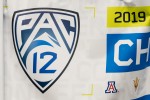It’s been said time and time again, but I think that’s for a good reason – it’s true.
The Pac-12 is a mess.
And “mess” is a bit of an understatement. There are plenty of more accurate, vulgar descriptions of the situation all over social media.
This has almost nothing to do with the Pac-12 garnering just four wins in March Madness over the past two years – two of which belong to this year’s Oregon squad – nor does it have anything to do with the conference’s 4-12 record in bowl games during that span.
The Pac-12’s recent struggles in revenue sports are historically rare, but that is not the root of the organization’s problems. For me, the best representation of the mayhem was the series between No. 1 UCLA baseball and then-No. 2 Stanford this weekend.
The two highest-ranked teams in the nation faced off in the regular season for the first time since 2016 and for just the 13th time since Baseball America started its rankings in 1980. It has been deemed “The Showdown Out West” and it very well could be a preview of a Super Regional or College World Series matchup.
What was the Pac-12 Networks’ plan for coverage of the series?
There wasn’t one. West Coast baseball fans tuning in for Friday’s game would have instead seen a re-airing of a women’s lacrosse game.
None of the series’ three games were televised on the conference’s flagship network, the project that Pac-12 commissioner Larry Scott was adamant would be the Pac-12’s first step towards becoming a powerful media mogul. Scott has tripped up time and time again – highlighted best in The Oregonian’s John Canzano’s in-depth, awarding-winning investigative series this fall – but I’ll try to hit some of the major points here.
Scott has said he wants to turn the Pac-12 into a media company, electing to turn down ESPN’s offer to run the Pac-12 Networks in favor of an independently-run entity. An entity that is not available nationwide, and one that is not available to DirecTV or Verizon Fios customers.
The NCAA, as a whole, seems to have constant problems in terms of televising nonrevenue sports. UCLA gymnastics broke the 198-point mark en route to an NCAA Regional victory in Ann Arbor, Michigan, on Saturday, but the event was not on television.
Sports like baseball, gymnastics and softball are becoming increasingly important to UCLA students, considering their growing appeal and consistent success. All three teams are in the running for national titles, and gymnastics put up similar attendance numbers to the men’s basketball team it shares Pauley Pavilion with – and that’s with the lower level baseline seats typically closed off.
But the Pac-12 makes it difficult for its biggest fans to support their teams, hindering their growth and alienating its new biggest assets.
So while blacking out the smaller sports is keeping the Pac-12 from reaching its full potential, Scott’s financial oversights on the bigger stage are costing the company millions.
The conference dished out $31 million to each of its members, 19% less than the Big Ten – which has 14 schools – and 32% less than the SEC – which is also made up of 14 schools. The new Pac-12 headquarters is in San Francisco, one of the most expensive real estate markets in the world. Scott’s salary of $4.8 million is higher than any Pac-12 football coach or fellow Power Five conference commissioner.
Scott and the Pac-12 schedule more late-night Thursday and Friday football games than any other major conference. An investigation into the conference’s replay review system uncovered that the league’s general counsel Woodie Dixon – who was not a trained official or replay expert – had called in to referees at the Sept. 21 USC-Washington State game to overturn a correct targeting call against the Trojans.
Wherever you turn, you find a new avenue that the Pac-12 has utilized to hemorrhage cash, fall into corruption or just simply exist in a perpetual state of ignorance.
It all starts at the top, with a misguided former Harvard tennis player leading the way. UCLA may be having its own administration problems within its athletic department at the moment – with the Varsity Blues scandal and messy men’s basketball coaching search making headlines – but the mismanagement of West Coast collegiate sports goes even higher.
The Pac-12’s mishaps are both grand and minute, and the extent of the problems and possible solutions is too widespread to discuss in full detail here, which is why I implore every sports fan to read Canzano’s entire series on the issue.
From ill-informed financial decisions to the poor management of sports of every shape and size, Scott and the Pac-12 are driving the Conference of Champions into the ground.
Sorry Bill Walton.

The tangible concerns voiced by fans have meant absolutely nothing. That the member institutions are content with driving an oil leaking and engine rattling jalopy on the sports media superhighway is beyond puzzling.